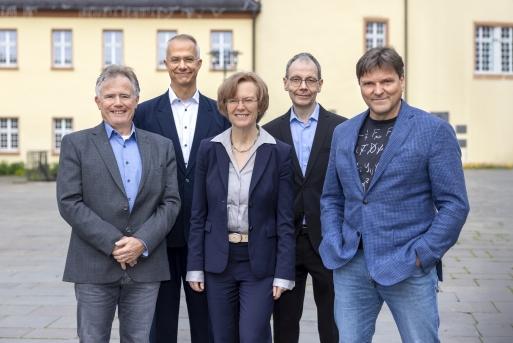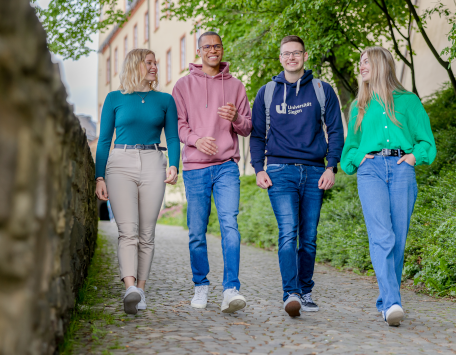Cluster of Excellence: "Booster" for physics in Siegen
A flag of its own on the German map of clusters of excellence: the success of the "Color meets Flavor" project in the Excellence Strategy of the federal and state governments has put the city and University of Siegen in the spotlight of the scientific world. The joint cluster with partners Bonn, Dortmund and Jülich is one of a total of 15 funded Clusters of Excellence in North Rhine-Westphalia. From January 1, 2026, NRW will have eight "Universities of Excellence" - Siegen is a new addition and the only former comprehensive university in Germany with a Cluster of Excellence in the new funding round.
"Considering that we only became a university from a comprehensive university a good twenty years ago, this is a tremendous success. We are now finally playing in the concert of the major universities - in NRW and Germany. This has a positive effect on the attractiveness of the entire university. Of course, the natural and technical sciences, and in particular physics, will benefit in particular," emphasizes University Rector Prof. Dr. Stefanie Reese.
The Cluster of Excellence "Color meets Flavor" strengthens the research profile of the University of Siegen and makes Siegen visible worldwide as a location for excellent physics. It also massively promotes young scientists: two new professorships in the field of particle physics will be established at the Siegen Physics Department as part of the excellence funding. The corresponding preparatory work has already been initiated and the appointments are now to be made in the near future. Students and doctoral candidates will benefit directly from this: The range of courses on offer in teaching will increase, and new opportunities will also open up for project work and theses in the future.
"We are already starting to support our students at Cluster of Excellence level at Bachelor level," says the spokesperson of the Siegen Cluster team and co-spokesperson of the overall initiative, Prof. Dr. Alexander Lenz. Siegen students will also benefit from the partnership with the universities of Bonn and Dortmund and the Jülich Research Center: In future, for example, they will be able to take part in joint, cross-location lectures. Bachelor's, Master's and doctoral theses can be written on the cluster's cutting-edge topics.
The cooperation also offers students the opportunity to take part in large-scale international experiments such as the ATLAS experiment at CERN in Geneva. "Studying physics at the University of Siegen already offers great opportunities. The Cluster of Excellence is an additional booster," says Lenz, who also emphasizes that decades of preparatory work were necessary to make all this possible and to create the conditions for the cluster application.
Particle physics already has a long tradition at the University of Siegen: research into the elementary building blocks of matter has been conducted in Siegen since the founding of the then comprehensive university in 1972. "When I came to the University of Siegen in 2003, the research area was already well established. We were able to build on this wonderfully and form a group that had enough clout to successfully acquire large-scale projects," reports Lenz's colleague (and predecessor) Prof. Dr. Thomas Mannel, a "second generation" particle physicist at the University of Siegen and today one of four Siegen research directors and deputy site spokesperson in the "Color meets Flavor" Cluster of Excellence.
In 2013, the German Research Foundation (DFG) approved the "Quark Flavor Physics and Effective Field Theories" research group, of which Mannel was the spokesperson and which was funded until 2019. This was followed by participation in the Transregional Collaborative Research Center "Phenomenological Elementary Particle Physics after the Higgs Discovery". Particle physicists from the University of Siegen are still conducting research here together with colleagues from the Karlsruhe Institute of Technology and RWTH Aachen University. At the University of Siegen, particle physicists from the fields of theory and experiment work closely together under the umbrella of the Center for Particle Physics Siegen (CPPS).
"We were able to build on all of these projects and structures in order to participate in this round of the Excellence Competition together with our partners. The fact that the University of Siegen has not only managed to get an application through to the final selection round for the first time, but has also been awarded a Cluster of Excellence, is simply gigantic. We now want to build on this success - there is enormous positive potential for our department and the entire university," says Lenz.


